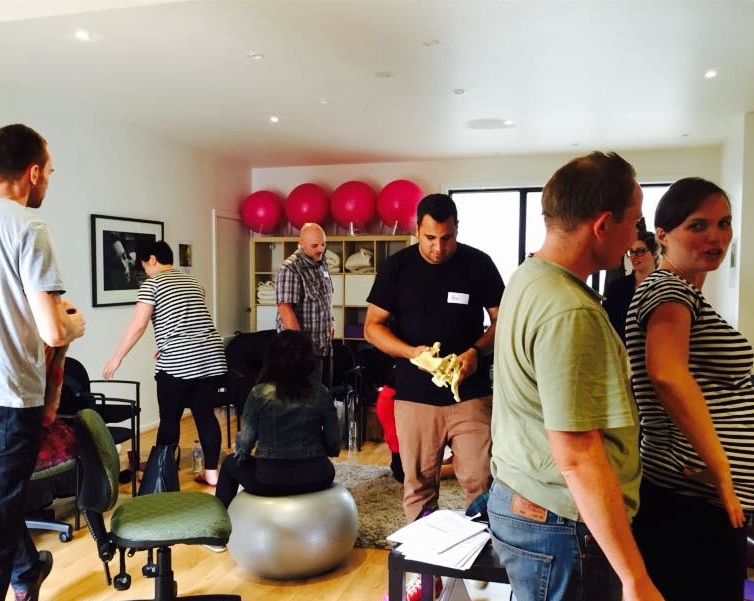Why don’t we value childbirth education?
By Tanya Strusberg, LCCE
If someone asked you what you thought was the leading complication of childbirth today, what would you say?
Fetal distress? Nuchal cord (the umbilical cord wrapped around the baby’s neck)? Complications arising from Caesarean section? Postpartum haemorrhage?
The correct answer: postpartum depression.
It is an illness often undetected and usually obscured by the woman, which causes her to suffer in silence. The new mother, who is depressed, is deprived of the pleasures and joys of caring for, and often bonding with, her newborn baby.
We know the role of the childbirth educator is critical and can play a significant role in helping to break this silence, first by providing the necessary education to help women and their partners recognize the early signs and symptoms of postpartum depression (PPD). Second, educators can help increase a woman’s understanding of how to meet her own needs.
Although prevention of PPD may not be completely possible, health professionals can help women recognise and reduce key risk factors. A recent major review of nearly 30 separate studies found that several interventions – including providing antenatal classes, information during the antenatal period, intrapartum (around the period of childbirth or immediately after the delivery) support, early postpartum check-ups and continuity of care – may have significant non-pharmacological preventative results.
But the fact remains that childbirth course participation rates are down and postpartum depression rates are up. Way up. It’s estimated that 1 in 7 women – a conservative estimate – will experience PPD. And it’s not just women who suffer. One in 20 men will also experience the often debilitating effects of this illness.
The fact that most of us spend more time researching what car we will buy, where we will go on holiday or even what brand of stroller is preferable, than we do exploring our options for pregnancy care, labour and birth, says a lot about contemporary culture.
When it comes to preparing for the massive life change of becoming a parent, most of us are looking for the Thermomix version of childbirth and parenting preparation, rather than the good old fashioned slow cooker.
When I was training to become a Lamaze Certified Childbirth Educator, part of my certification requirement was to write a teaching curriculum for a childbirth education course that was a minimum of 12 hours long (I ended up designing a 15-hour curriculum).
In an ideal world, a woman starts a Lamaze course when she is 30-32 weeks’ pregnant. Typically, it comprises five three-hour weekly classes, so the mother-to-be ends the course close to her due date with all the information learned fresh in her mind. Very often, childbirth educators also run reunion classes after everyone has had their baby.
In reality, childbirth educators are lucky to convince couples to sign up for perhaps a two- or three-session course. Why is this? Why do we place so little value on preparing ourselves for one of the most (if not the most) significant life changes we will ever experience?
Don’t we owe it to ourselves and our growing baby to spend a few weeks preparing emotionally, psychologically and physically for the intense demands of labour, birth and early parenting?
Much research has gone into the causes of PPD, as well as the factors that can help minimise a woman’s risk of developing it.
Quality childbirth education benefits parents-to-be in so many ways. Classes help to dispel many of the myths surrounding labour and birth, which directly impact on the level of fear and anxiety with which a woman approaches childbirth. Couples learn about common interventions and most importantly, how to avoid them. They will leave with a sense of confidence about making informed decisions that are based on current evidence, and how to develop a positive relationship with their care providers.
Early parenting is also covered, with important information on breastfeeding, newborn care and changing relationships. All of these topics are critically important and can make a profound difference to a couple’s ability to cope in the first few months after their baby is born.
The pregnancy & baby expos and retailers would like to convince you that the most important decisions you need to make are whether to buy the latest stroller import from Italy or Spain, or whether you should get the baby monitor fitted with an infrared camera. But unless you are emotionally prepared for the realities of parenthood, no amount of state-of-the-art gadgets are going to help you when it’s 3am and you are sleep-deprived and have no idea how to calm your howling newborn.
Give yourself and your partner the best possible gift to celebrate the birth of your new baby: book in for an independent childbirth education course. It will be the gift that keeps on giving.
Tanya Strusberg is currently the only Lamaze Certified Childbirth Educator (LCCE) in Australia and teaches prenatal education to pregnant women and their partners in Melbourne. She is passionate about inspiring, educating and empowering women to feel confident about their body’s ability to give birth naturally and without unnecessary medical intervention. Tanya and her husband Doron have two beautiful children, Liev and Amalia.
To learn more visit www.birthwellbirthright.com
Facebook: https://www.facebook.com/birthwellbirthright











I didn’t even know about classes outside of the hospital until I read this article. My whole birth and breastfeeding experience was nothing like I had hoped. I had PPD most likely because of my experience and in talking to others, I’m not the only one. I really wish that such classes were promoted more so that others don’t go through what I did.